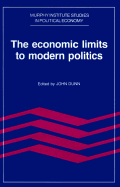Book contents
- Frontmatter
- Contents
- Preface
- List of contributors
- The economic limits to modern politics
- Introduction
- 1 The economic limits to modern politics
- 2 Free trade and the economic limits to national politics: neo-Machiavellian political economy reconsidered
- 3 The political limits to premodern economics
- 4 On some economic limits in politics
- 5 International liberalism reconsidered
- 6 Capitalism, socialism and democracy: compatibilities and contradictions
- Index
1 - The economic limits to modern politics
Published online by Cambridge University Press: 01 June 2011
- Frontmatter
- Contents
- Preface
- List of contributors
- The economic limits to modern politics
- Introduction
- 1 The economic limits to modern politics
- 2 Free trade and the economic limits to national politics: neo-Machiavellian political economy reconsidered
- 3 The political limits to premodern economics
- 4 On some economic limits in politics
- 5 International liberalism reconsidered
- 6 Capitalism, socialism and democracy: compatibilities and contradictions
- Index
Summary
How is it possible to understand modern politics, say, the modern politics of the United States and Britain, of Japan and North Korea, of the Philippines and Burkina Faso, of the Soviet Union and Brazil?
It is, of course, impossible to understand the politics of anywhere at any time without knowing a great deal about that place at that time. But in addition to such immersion in the particular it is also always helpful to consider techniques of understanding or approaches towards understanding: how to understand, not what is the case. In this respect at least, in its comprehension of the scope and limits of its own techniques of understanding and its own approach, the academic discipline of political science has been a fairly unmitigated intellectual disaster. This is no doubt, so far as it goes, an occasion for legitimate merriment. But it reflects a much wider cognitive failure (a failure which runs in some measure through the entire citizenry and governmental circles of nation states across the world today). In this form it seems exceedingly unlikely that the limits on the intelligibility of modern politics are to any degree a good thing: not least, because it is now apparent even to such reluctant learners as the political leaders of the United States and the Soviet Union that only a drastic and imaginative extension of its collaborative political skills can give the human race a reasonable prospect of protracted survival in the world in which we now live.
- Type
- Chapter
- Information
- The Economic Limits to Modern Politics , pp. 15 - 40Publisher: Cambridge University PressPrint publication year: 1990



